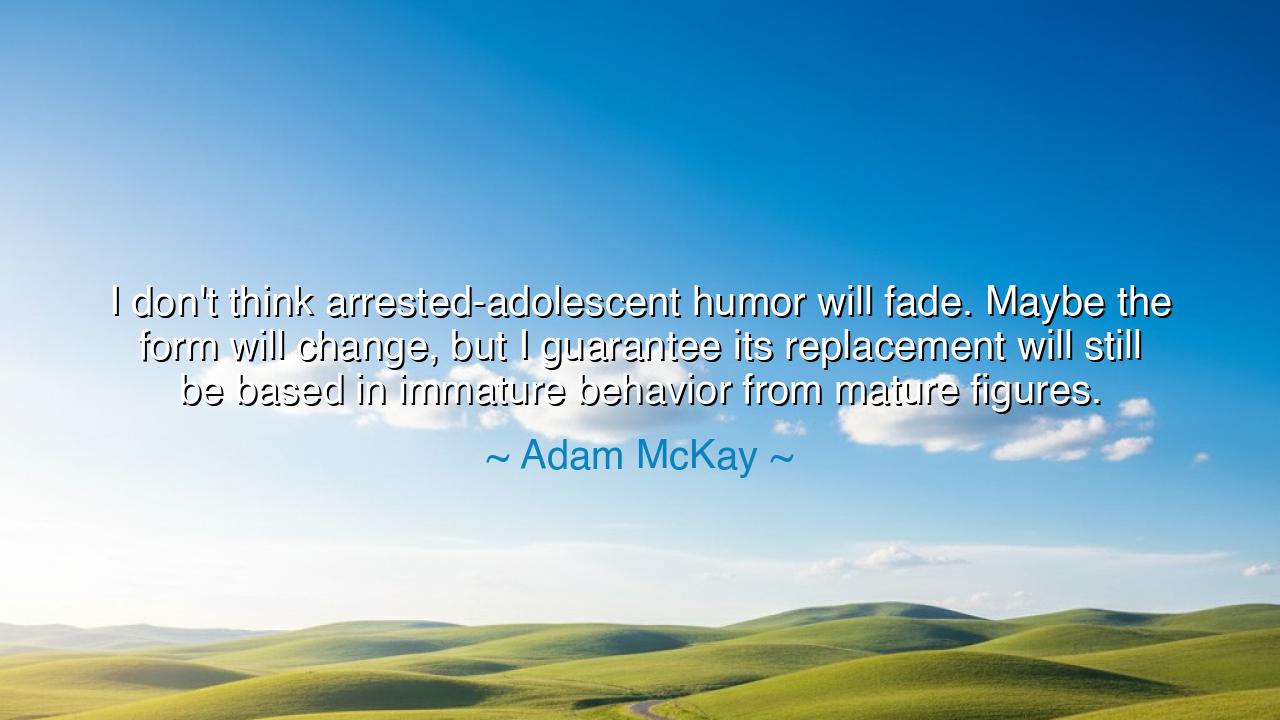
I don't think arrested-adolescent humor will fade. Maybe the form
I don't think arrested-adolescent humor will fade. Maybe the form will change, but I guarantee its replacement will still be based in immature behavior from mature figures.






Hear the words of Adam McKay, the chronicler of folly and the sage of satire: “I don’t think arrested-adolescent humor will fade. Maybe the form will change, but I guarantee its replacement will still be based in immature behavior from mature figures.” Though this may sound like the observation of a comedian, it is, in truth, the philosophy of a thinker who understands the eternal duality of the human heart. For in every age, from the courts of kings to the corners of modern screens, mankind has always laughed when dignity and immaturity collide.
What McKay reveals here is not simply a truth about humor—it is a truth about the nature of man. We are creatures who grow older but rarely grow entirely wise. The body matures, the face lines with years, yet within us dwells the same restless child—reckless, curious, and unrefined. Arrested-adolescent humor, then, is not an invention of the modern world, but a reflection of this eternal tension: the mature soul behaving with the foolishness of youth, the scholar tripping over his own robe, the noble losing his temper over trifles. It is laughter born of recognition, for every human heart knows itself to be both lofty and absurd.
The ancients understood this balance well. The playwright Aristophanes, whose works filled the Athenian air with laughter, mocked generals and philosophers alike, dressing them in the garb of fools and dreamers. Even Socrates, that titan of reason, was once portrayed as a cloud-chaser, lost in lofty nonsense. The people laughed, not because they despised wisdom, but because they saw truth hidden within the jest: that even the greatest minds can stumble, that every man’s gravity hides a shadow of childishness. Thus, the laughter that springs from immature behavior in mature figures is not cruel—it is cleansing. It humbles the proud, it disarms the serious, and it reminds the wise that wisdom without humor becomes tyranny of the soul.
This form of laughter has never vanished, for it is woven into the fabric of human nature. In the medieval courts, jesters mocked kings to keep them honest. In the halls of modern politics, satire still tears at the robes of the self-righteous. And in the stories told by comedians and filmmakers, like McKay himself, the pattern continues—the powerful and the polished undone by their own pettiness, the heroes revealed as bumbling men beneath their armor. Such tales endure because they speak the language of truth. The immature within the mature will always reveal the soul more honestly than any mask of perfection ever could.
Consider also the tale of Marcus Aurelius, the philosopher-king of Rome. Though revered as the embodiment of stoic virtue, even he confessed to moments of irritation, folly, and childish longing. In his Meditations, he chastised himself for vanity and pride, admitting that no man, however disciplined, escapes the pull of his own lower nature. He might not have laughed at himself, but others surely could have—and rightly so. For laughter at imperfection is not mockery; it is mercy. It reminds us that no one, not even an emperor, can rise above the raw, untamed spirit of humanity.
So when McKay says that arrested-adolescent humor will never fade, he speaks of something immortal—the laughter that springs from the fallibility of greatness. Its form may change: once told through the masks of Greek comedy, now through cinema and satire. Yet its heart remains the same. It is the laughter that meets hypocrisy with truth, pride with humility, solemnity with joy. It is the laughter that unites the wise and the foolish alike, for in that moment, all are reminded that they are human.
Let this, then, be the lesson: do not scorn the childish spirit within you. Guard it, for it is the source of your creativity, your curiosity, and your capacity for joy. Do not be ashamed to laugh—especially at yourself—for laughter is the voice of freedom. But let that laughter also be wise. When you see the proud stumble, laugh not with cruelty, but with compassion. When you stumble yourself, let your laughter be a confession, not a curse. For the man who can laugh at his own folly has conquered pride, and the society that can laugh at its leaders has preserved its soul.
Thus, remember the wisdom of Adam McKay: though ages pass and forms evolve, immature behavior from mature figures will always be the spark that lights our laughter—and our understanding. For humor, at its highest, is not a rejection of maturity, but its completion. It is the echo of humanity’s oldest truth: that the wise and the foolish are brothers, walking hand in hand, laughing together beneath the same eternal sky.






AAdministratorAdministrator
Welcome, honored guests. Please leave a comment, we will respond soon